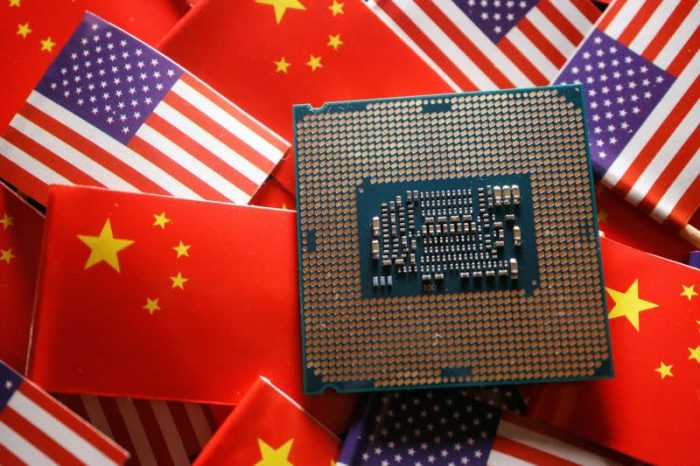Global chip stocks have shed nearly $600 billion in value since Wednesday over concerns that the US-China technology war is set to worsen.
Overnight, Wall Street’s semiconductor index lost more than $500 billion in value in its worst session since 2020.
Ripples of that hit Asian chip and technology stocks on Thursday, triggering sharp slumps in Taiwan Semiconductor Manufacturing Co (TSMC), Japan’s Tokyo Electron, and South Korea’s SK Hynix.
Also on AF: ASML Has Sold One in Two Chipmaking Machines to China This Year
The Global X Asia Semiconductor exchange-traded fund fell 1.74%, reducing gains for the year to 16.7%.
Remarks from Republican presidential nominee Donald Trump saying key production hub Taiwan should pay the United States for its defence deepened selling in chip stocks.
Biggest losers
The latest worries for chip investors come after Washington in recent years has adopted a more protective stance for the US semiconductor manufacturing industry, which it views as strategically important for competing against China.
The United States has reportedly told allies it is considering using the most severe trade curbs available if companies continue giving China access to advanced semiconductor technology.
Jitters over the possible impact of that brought heavyweight chip firms to their knees during US market hours on Wednesday.
US-listed shares of Dutch chipmaking equipment provider ASML Holding slumped 13% losing over $60 billion in value. Meanwhile, AI heavyweight Nvidia fell almost 7%, losing more than $200 billion in market capitalisation.
China accounted for about 49% of ASML’s lithography system sales in the second quarter and represents about 20% of its order backlog.
Smaller rivals AMD and Arm dropped about 10%, while Micron fell 6% and Broadcom lost 8%. Together their shares lost over $118 billion in value.
The Philadelphia Semiconductor index collapsed 6.8% in its biggest one-day decline since the Covid-19 pandemic sent global markets into a tailspin.
The index remains up 30% for 2024, outperforming the S&P 500 index’s 17% gain, thanks to the AI boom.
Meanwhile, US-listed shares of Taiwan’s TSMC fell nearly 8% erasing $77 billion in value, after the sell-off deepened over Trump’s remarks.
Taiwan plays an outsized role in the global chip supply chain. Analysts have warned that any conflict over the island may shatter the global economy.
Asian carnage
Over in Asia, technology behemoths in Taiwan, Japan and South Korea suffered similar losses.
South Korean memory chipmaker SK Hynix slid 3.6% losing nearly $4 billion in value.
In Japan, Tokyo Electron slumped 8.75%, wiping $8.6 billion off its market cap. Peers Disco, Screen Holdings and Renesas Electronics skidded 9%, 8.5% and 6.2% respectively, together losing over $6.7 billion in value.
Taipei-listed shares of TSMC have, meanwhile, shed roughly $52.13 billion (T$1.7 trillion) in market value over two days. Shares of the firm were down over 2% on Thursday even after it posted a quarterly net profit that beat market expectations and forecast third-quarter revenue to surge by as much as 34% from a year earlier.
TSMC said in its first-quarter earnings report that 69% of its revenue was from customers based in North America and 9% from China. Similarly, a March corporate filing from SK Hynix stated 31% of its sales came from China last year.
Other Taiwanese chip firms that slumped included Foxconn, Mediatek and Quanta — together shedding $7.5 billion in market cap.
Breather likely
President Joe Biden’s administration has moved aggressively to curb Chinese access to cutting-edge chip technology, including sweeping restrictions issued in October to limit exports of AI processors designed by firms including Nvidia.
The curbs have dented US chipmakers’ sales to China. Nvidia’s revenue from China stood at about 18% of its total revenue in the quarter ended April 28, compared with 66% in the year-ago period.
The latest wrinkles in Sino-US relations have sped up what appeared to be initial signs of investors’ rotation from Big Tech stocks into smaller value ones, on the view that lower US rates will benefit smaller companies.
The global AI boom has driven a blistering rally in tech stocks this year that has surpassed records, with the Nasdaq up 20% to date, while the S&P 500 has surged 17%.
“Positioning had become very extreme in the semi-conductor/AI space and the import curb comments catalysed a de-risking event,” said Jon Withaar, who manages an Asia special situations hedge fund at Pictet Asset Management.
Even so, Thursday could see Wall Street recoup some of its losses.
“Market reactions are likely short-lived because the fundamental factors driving these markets haven’t changed. Yes, US restrictions on shipments to China will likely increase somewhat – regardless of the US election outcome – but they’ve already been in place for a while,” said Bob O’Donnell, chief analyst at TECHnalysis Research.
- Reuters, with additional inputs from Vishakha Saxena
Also read:
Taiwan Chip Firm GlobalWafers Wins $400m For US Factories
Taiwan’s Exports Jump in June Thanks to AI Chip Demand
China’s AI Chip Firms Downgrade Designs to Keep Access to TSMC
Taiwan’s TSMC Joins Trillion Dollar Club Amid AI Frenzy
China Unveils Video of Simulated Invasion of Taiwan
Beijing Slams US Plan to Review China’s Supply of Legacy Chips
China’s Third Chip Fund Gets $47 Billion to Boost Output
SMIC, Huawei Big Winners as China Ramps Up Chip Funding























